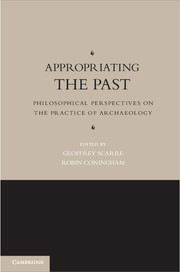Book contents
- Frontmatter
- Contents
- Contributors
- Editors
- Chapter 1 Introduction
- Part One Claiming the Past
- Chapter 2 The Values of the Past
- Chapter 3 Whose Past? Archaeological Knowledge, Community Knowledge, and the Embracing of Conflict
- Chapter 4 The Past People Want
- Chapter 5 The Ethics of Repatriation
- Chapter 6 On Archaeological Ethics and Letting Go
- Chapter 7 Hintang and the Dilemma of Benevolence
- Part Two Problems of Meaning and Method
- Part Three Problems of Ownership and Control
- References
- Index
Chapter 7 - Hintang and the Dilemma of Benevolence
Archaeology and Ecotourism in Laos
Published online by Cambridge University Press: 05 December 2012
- Frontmatter
- Contents
- Contributors
- Editors
- Chapter 1 Introduction
- Part One Claiming the Past
- Chapter 2 The Values of the Past
- Chapter 3 Whose Past? Archaeological Knowledge, Community Knowledge, and the Embracing of Conflict
- Chapter 4 The Past People Want
- Chapter 5 The Ethics of Repatriation
- Chapter 6 On Archaeological Ethics and Letting Go
- Chapter 7 Hintang and the Dilemma of Benevolence
- Part Two Problems of Meaning and Method
- Part Three Problems of Ownership and Control
- References
- Index
Summary
Archaeology and ecotourism have emerged as a rewarding global-scale relationship over the past couple of decades. To archaeologists longing for a globalizing emancipation from problematic nation-state projects and to tourism operators in need of scientific depth to satisfy an affluent academic clientele, it has appeared as a win-win relationship for all parties involved. Harmonious choirs have spoken of positive opportunities for corporate benefits and effective poverty alleviation for marginalised local communities. Few critical voices have been raised. My experiences of working with two archaeological sites in Laos that have also been target sites for ecotourism (Källén 2004a; Källén 2004b; Keosopha & Källén 2008) suggest, however, that the relationship is far from an unproblematic one. In this chapter I take you to one of these places, Hintang, for a critical inquiry into the relationship between archaeology and ecotourism in Laos. My objective is to show how, notwithstanding its positive potential, the archaeology-ecotourism match defines and establishes a structure for unequal human relations that are inconsistent with its own positive rhetoric and quite problematic from an ethical point of view.
ARRIVAL
At first you see only the stones. They are called hin tang, in Lao, meaning ‘standing stones’. Bunches of stone planks line ancient pathways deep in the forest, like beads on a string along a twelve-kilometre mountain ridge. Among the standing stones you see large stone discs on the ground, amazingly thin and skilfully crafted from micaceous schist. Beside some of the discs are deep holes in the ground, a few with steps hollowed out or inserted into the walls. These are entrances to underground chambers, once covered by the large discs. Since long forgotten times they have been there, stones, discs, and chambers. We find them in Hua Phan Province in the northeastern corner of Laos, near the border with Vietnam. Hua Phan is characterised by its breathtaking mountainous landscape and is famous for its production of high-quality textiles. It is also known as the birthplace of the Lao communist movement Pathet Lao, and as a consequence of that the province was subject to heavy bombardment during the Vietnam War. Hua Phan is today one of the poorest of Laos's fifteen provinces, and Laos is one of the poorest countries in Asia.
- Type
- Chapter
- Information
- Appropriating the PastPhilosophical Perspectives on the Practice of Archaeology, pp. 119 - 138Publisher: Cambridge University PressPrint publication year: 2012



